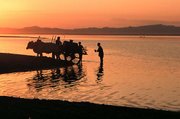Thursday, May 10, 2007
Myat Myat Noe Noe
I was born in Myaung Mya Myo, Burma. My name, Myat Noe, means “precious.” Before I was able to say my first word, both of my parents, who were educators at the time, were arrested and put in jail for simply being Seventh-day Adventists because that was considered a crime in my native country, Burma. I firmly believe no one in this world should be deprived from his/her basic human rights. I feel that it is not only my moral duty but it is also my destiny to help create a world in which every human being enjoys all of the human rights no matter what one’s ethnicity, skin color, demographic location, or religious belief is. Therefore, defending human rights victims and prosecuting the violators are issues that concern me the most. In the process of fulfilling my task, I hope to be a witness for God.
I learned at an early age that it is better to not have been born than to live with fear. But no one needs to live with fear permanently, not if the rest of the world has something to do about it. Through advocacy, awareness, and action, tyranny can be stopped, and it can even be prevented. When tyranny is terminated, many precious lives will be protected and saved. I seek for every opportunity to contribute my knowledge to others about injustice and human rights violations in Burma, because advocacy, awareness, and action are the keys to liberating Burma. After all, injustice in Burma is a threat to all of mankind.
My family and I are far away from the place we call home, and we presently reside here in the United States. No one should be afraid to breathe or to speak, and no one should be forced to leave their homeland. So having been exposed to human rights abuses, I am utterly blessed to be able to exercise my rights, and I am willing to give my best effort and my life for the fundamental rights of others. Life is not worth living if you live only for yourself.
I left Burma when I was eleven. The year was 1998.
I can recall the day in autumn when two Burmese activists came to my history class to share their experiences with human rights violations. That was the first time I was introduced to Burmese politics. My consciousness was wide-awake. They caught my attention. However, it did not last within for I was only twelve at the time. Luckily, I found another opportunity. This time was more vivid than the previous one, for I believe my destiny was revealed and implemented in my heart by my hero, Chaw (Brother in Ka-ren).
I am currently a third year undergrad student majoring in Operations Management at the Robert H. Smith School of Business. Upon my graduation from the University of Maryland, I plan to seek further education. I am undecided at this point. Law school, MBA, or something. There are many possibilities. I am avaricious when it comes to education solely because it is such a blessing to have the privilege to study in the United States. I seek for higher education, and I study hard so that someday I can share what I have learned with those who do not have the chance to go to school.
For the time being, each person that knows me will learn to know about Burma, because I strongly believe that human rights should be the concern of every moral human being. I will keep fighting for the voiceless victims of human rights violations around the world and abolish their perpetrators. I will actively continue to dedicate my life in the struggle for Burma’s freedom. One day soon when Burma gains democracy, I will gladly return to my homeland and be a part of rebuilding the newly freed nation.
My parents say I am a dreamer. I say I want to be an instrument of God. I want to use the gifts I've been blessed with to it's highest potential. This world is not my home for my home is with my Heavenly Father. But there is much work to be done. The Lord has bestowed great responsibilities on mankind and on me, His servant.
Driven by the Truth and His Compassion,
~myatnoe
Friday, May 4, 2007
Youth from Burma
Last Friday, I got a chance to participate in a youth symposium of
The last class is poor and underprivileged who cannot afford even basic education. They are the majority. Because of political instability and mismanagement of the regime, economy in
On the other hand, there are hundreds and thousands of young people living in the refugee camps along Thai Burma border. I met these young refugees when I studied in
I also mentioned Dr. Thein Lwin, who is the Director of migrant learning center and teacher training programs. I informed the audience to visit his website at http://www.educationburma.net for more information. That's my two cents.
Winmay

